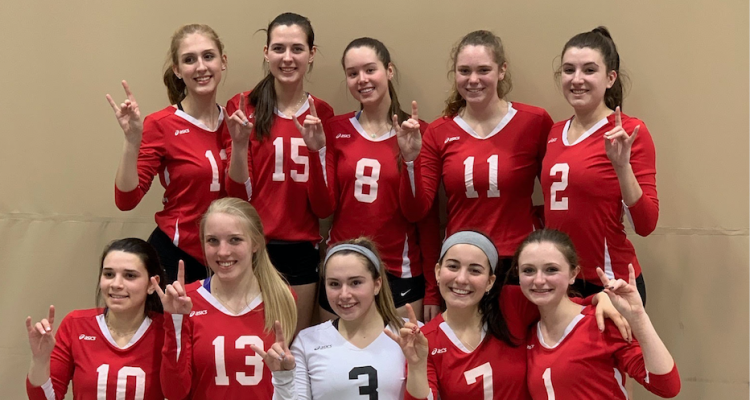Every day, sports headlines are peppered with the latest updates on the status of Division I athletics, and how they plan to push through the pandemic. Unfortunately for club athletes, many questions remain unanswered regarding their plan to return to practice. Although a hallmark of this virus is uncertainty, athletes who seek to pursue their passion on a less intense stage are yet another population who must play the waiting game.
The president of the women’s club volleyball team at Fairfield University is Milena Ciaccia ‘21, who has been a member of the team for four years now. Of course, this is not how she anticipated her senior season would play out; however, she remains hopeful that her and her beloved teammates will be able to return to the court in no time. “I think that the fall will be a big testing period, not only for us [club athletes], but everyone in general,” exclaimed Ciaccia, recognizing the importance of students’ responsible behavior this semester. She realizes that following community guidelines is essential in deciding whether or not Stag Country will be welcomed home again in the spring.
The squad was scheduled to attend the 2020 National Collegiate Volleyball Federation Volleyball Championships in Kansas City, Mo. on the weekend of April 9. The tournament was canceled on March 13 in a statement released by NCVF president Sante Perrelli. The announcement stated that, “After assessing risks, communicating with USA Volleyball and working with constituents around the country, the NCVF Board has voted unanimously in support of this action [to cancel the event].” The abrupt end to graduating Stags’ careers certainly conjures worry that history may repeat itself, but such a reality is not only up to the discretion of the University, but also to the Northeast Women’s Volleyball Club League. Per the NWVCL, no tournaments are permitted to be held in the fall for any reason. According to the Fairfield libero, the league is looking into insurance for both the referees and the athletes who are a part of the NWVCL, but no definite decisions have been made at this time.
The traditional volleyball game entails having six players on either side of the net, tallying to a total of twelve players on the court at a time. According to a message sent to all students from the Dean of Students, William H. Johnson, Ph. D., “gathering in groups of more than 10 is not permissible at any time, in any location, indoors or outdoors, without the approval of authorized University personnel.” This makes it impossible for the women to practice as a cohesive unit, leaving student-leaders like Ciaccia to be crafty in their decision making. She and her teammates have come up with some ideas to facilitate practice safely, but the most prevalent challenge that playing volleyball has posed during these times has to do with contact. To avoid as much physical contact as possible, they have pondered the idea of practicing in pods, or smaller groups, divied up by position. This way, these small groups will practice exclusively with each other, avoiding contact with too many people.
The senior explained that club teams received notice over the summer from the director of recreation, Eli Olken-Dann, that club athletes would have to serve a 10-day grace period on campus before scheduling any practices. This way, the University could monitor the reintegration of students back into the community closely, and ensure that it was safe to proceed with extracurricular activities. As of the most recent email sent to club teams by recreation, that 10-day period has been protracted to last until Oct. 1. This is not to say that practices will resume as normal. Olken-Dann and the Department of Recreation have worked tirelessly to create a procedure which would be in the best interest of the health and safety of both the club athletes, and the University community. Any club team that chooses to continue their sport this season must follow strict protocols. The Club Sports Operating Requirements state that “club athletes will be required to submit verification of their daily health screening, the day of their engagement or training to the supervisor on duty,” and that “club teams will declare more than 24 hours in advance, who will be attending any given practice.” Additionally, every team who looks to participate in practicing this season must submit a written report for their plan of action and guidelines, which they are required to get approved.
These rules, among others which were outlined in great detail to all club athletes, were thoughtfully curated. Some of these regulations seem like COVID-19 common sense, but others will take some getting used to for players. In terms of explaining their group, Ciaccia was disappointed to report that the usual influx of interested first-years was expectedly underwhelming this year following the activities fair, which was hosted via Life@Fairfield. Nonetheless, she looks forward to expanding the group and intends on implementing measures to conduct tryouts which comply with rules set by the Department of Recreation. “Women’s volleyball, and Milena in particular, have been really good about being in communication with us. I know they are really eager to get going with us in the next couple of weeks,” Olken-Dann said, confidently.
In the face of adversity, Fairfield University’s women’s club volleyball team is more ready than ever to take on any, and all, challenges that coincide with this season, so long as it means they can do what they love.
“I would trust these girls with my life. I can’t imagine my college experience without club volleyball,” Ciaccia said devotedly. In just a few short weeks she will hit the court, with a new fervor and understanding of what it means to be an athlete at Fairfield University.


Leave a Reply